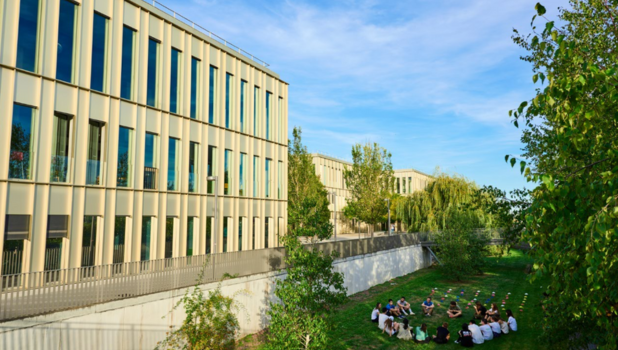Valentine Japiot (H.23) and Max Pernaton (H.25), two members of HEC Transition, the alumni club dedicated to the ecological transition, rang similar alarm bells, calling for a radical transformation of the system at HEC's Climate Day 2023. Quentin Oulie (H.25), currently interning at “Fermes d'avenir,” which coordinates sustainable farms, co-organized a three-week course on agroecology at HEC for students to think about the challenges facing the agricultural world. The list could go on and on. Those engaged are making their demands heard, and they are ready to take on responsibilities to make things happen. We met four students from different HEC programs, engaged or not in the transition.
What do you think is the role of a business school like HEC in the transition towards sustainable business?
Hale De Vera, MBA candidate, VP for Knowledge of HEC's Sustainability Club: The main role that business schools have is to help students become the next leaders. In a world that is becoming increasingly hotter (at a very alarming pace!), there's a bigger expectation for business schools to plant the seeds and act as catalysts of change among their students to ensure that they hone competent yet socially and environmentally aware students. This can be done by fostering within the classrooms a culture of corporate responsibility, ethical decision-making, and environmental awareness among its students, thereby encouraging them to consider social and environmental impacts in their future business endeavors. May it be in the form of adding ESG-related cases or topics in broader business topics such as strategy and finance, concrete steps such as this should be enforced by business schools.
Behishta Nazir, SASI student. After fleeing Afghanistan in 2021, she became one of the first HEC Imagine Fellow scholars*: Training and educating future managers, executives, and employees, I believe it is the role of business schools to educate sustainability and sustainable business practices. Climate change, biodiversity loss, human rights issues, and other issues require immediate action from many ecosystem actors. It is the responsibility of the school to properly educate future managers and decision-makers in the business sector. Furthermore, a school like HEC has an even greater responsibility to inspire and lead other educational institutions and industry players in its capacity as a leader in the field.
Madhavi Bharatham, former Program manager at Amazon, MBA candidate, and President of the HEC Paris MBA Council: Schools like HEC hold a special responsibility in carving leaders to achieve sustainable standards. Many impactful business leaders are born from these institutions, making it extremely important for them to present the values of sustainability from the very foundation. HEC is a hub of modern commerce; it's crucial for it to grasp the rapid, dynamic changes that align with climate shifts, socio-economic impacts, and more.
Many impactful business leaders are born from these institutions, making it extremely important for them to present the values of sustainability from the very foundation.
The business world has been in a transitional phase for over a decade now, but it's the leaders' responsibility to expedite this transition. They must acquire the skill of acceleration from esteemed business schools like HEC. This holds immense urgency, and there's absolutely no time for a pilot phase.
L., Grande Ecole student: Business schools such as HEC have the responsibility to train future leaders who will shape tomorrow's climate standards.
Business schools such as HEC have the responsibility to train future leaders who will shape tomorrow's climate standards.
Therefore, it is essential to instill critical thinking and decision-making skills that consider environmental impacts in students. Not only by raising awareness about the importance of environmental action, which is already extensively done, but also by actively teaching students how to integrate responsible practices within businesses and society, and presenting new business opportunities or possible jobs.
What do you think of the curriculum review that occurred at HEC Paris?
Hale De Vera: Twenty years ago, I would say that HEC was ahead of its time with the creation of the SASI Master. Veering away from traditional business courses is no easy feat, especially if professors and curriculums are hardwired into teaching orthodox thinking. Now that they've been able to carve out sustainability-focused programs (and specialization in the case of MBA), I think this is a good step in ensuring that HEC graduates are holistic and inclusive in their approach toward solving business problems.
Behishta Nazir: As a student of SASI, I believe what we study as part of this program at HEC is great and groundbreaking. I wouldn’t say it is enough, however. We need to do more, to fight harder, and to take more responsibility. But I think it is very important that we speak about all these different topics (from Climate Change and environmental issues to Human Rights, Peace, and Development) in a business school that inspires and enables us (the students) to create a change and to put sustainability and responsible business practices back into the core of the business.
Madhavi Bharatham: From my perspective, there is much room for improvement, not particularly in the structure but in the content. And I understand the reason behind the vagueness we have today as it is still in its experimental phase. I believe the levers of sustainable business need to be experienced more at practical, on-hand levels. For example, the capstone projects are proposals that students present to the audience, and a lot of rigorous research analysis and study goes into proposing them. However, unless and until the execution begins, nobody would know whether it's a success or not. Having courses that take you outside your classroom doors and plunge you out into the world with real-life experiences is important. This is a unique curriculum; it is a mix of both statistics from the past and probabilities of the future. It is aimed at a business model that generates revenue and ethically and morally sustainable employment.
L.: This holistic approach ensures that all students benefit from an updated and forward-thinking curriculum, equipping them with the mindsets needed to contribute positively to society. However, in class, there's often a feeling that the environmental aspect is always there to be checked off to consistently remind us of the importance of considering environmental issues in all decision-making.
This holistic approach ensures that all students benefit from an updated and forward-thinking curriculum, equipping them with the mindsets needed to contribute positively to society.
I believe there's still room for improvement regarding the rigidity of the fieldwork and associative engagement formats, which sometimes seem imposed rather than genuinely integrated into personal reflection. Nonetheless, it's clear that HEC is making efforts in this regard and is off to a great start.
What should be improved at the school to best train the students?
Hale De Vera: I would say that an increased collaboration among industry experts should be done better by HEC. When I was doing my specialization in Sustainable and Disruptive Innovation as part of the MBA program, we would have guests in our class and hear actual stories from various industry leaders in different fields (L'Oreal, Startup founders, Google, Ralph Lauren, etc.). This experience was very useful for us in understanding how it unfolds in real life. Of course, we're all aware of climate change, and of course, we know that we have a role to play in fixing this, but what's more challenging is identifying the HOW. How can we, as future business leaders, act on this challenge? In the interactions I had with companies, it was encouraging (and very informational!) to hear the concrete steps that they're undertaking to transition to a more sustainable business model. Maybe by embedding these interactions in core subjects (finance, strategy, marketing, operations, etc.), we get to see the whole picture of how students can make an impact, whichever role and industry they end up being a part of.
Increased collaboration among industry experts should be done better by HEC.
Behishta Nazir: In my opinion, we need greater representation of international students, specifically from developing countries, in the school. We need to reach them and enable them to leverage the knowledge, expertise, and skills they gain from these great programs in their home countries. We need to train and invest in future leaders of Africa, the Middle East, and Asia. The school has this incredible opportunity to bring together people from different backgrounds, countries, and experiences to create dialogue and inspire action. More representation of the Global South, in my opinion, will also contribute to a better understanding of the various dynamics present in those nations as well as the global, as opposed to just European, context of the social and environmental crisis and issues they face.*
Madhavi Bharatham: By making the students believe that sustainable business is not an option but a requirement. There needs to be metrics in place for all students to measure how much impact they are making, and it needs to be both audible and visible. Our canteen lights, classrooms, projectors, etc. are often on all night. Make changes to the energy wastage and make these changes loud. These noises are small but will create a bigger impact. Students need to see that HEC does not just preach; they act too, and it’s time we prove them with examples starting from basics.** Maybe begin with making a "2tonnes" simulation (on carbon footprint) mandatory for everyone on campus.***
There appears to be an underestimation of students' understanding of the urgency surrounding climate issues.
L.: There appears to be an underestimation of students' understanding of the urgency surrounding climate issues, leading to repetitive speeches on how the planet is affected. This redundancy often fosters disengagement amongst students, particularly when the presentation of tangible solutions is lacking. I feel like there's a need for courses to offer more concrete and technical content rather than solely focusing on numbers and facts about climate change.












